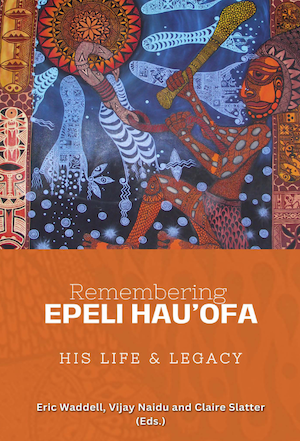By Aisha Azeemah in Suva
With the lights on one of his sneakers blinking as he ran through the gallery, a little boy looked up at several works of art. One of them was a sculpture of his grandfather: the man who changed how we see the Pacific — Epeli Hau’ofa, a name renowned across the Pacific as writer, as artist, as mentor, as friend.
The great Hau’ofa certainly wore many hats and made his mark on many lives, and his influence did not end the day his breath did in 2009.
The Tongan-Fijian writer and anthropologist was, among other things, the founder of the University of the South Pacific’s Oceania Centre for Arts.

A man who recognised the need for a place where fellow creatives could create, he can be credited with nurturing several generations of Pacific writers and artists.
His own work, particularly his side-splitting short stories and his 1993 paper titled “Our Sea of Islands” which sought to destroy the notion that Pacific Islands were small and insignificant in the larger world around us, will live on forever in the hands of academics.
But now, those who knew and loved the man have gone the extra step to ensure his name lives on. On March 7, 2024, a book titled “Remembering Epeli Hau’ofa: His Life and Legacy” was launched at the University of the South Pacific’s Laucala Campus in Fiji.
The book, a compilation of the memories of and odes to Hau’ofa, was compiled and edited by Eric Waddell, Professor Vijay Naidu and Dr Claire Slatter.
Poetry opening
Current director of the Oceania Centre for Arts and a renowned artist himself, Larry Thomas, called the book launch to order. Professor Sudesh Mishra read out a poem he wrote about Hau’ofa that can be found in the opening of the book itself.
The book was officially launched by USP Deputy Vice-Chancellor Dr Giulio Masasso Tu’ikolongahau Paunga, sharing the tale of a younger Hau’ofa amused at Dr Paunga’s very formal tie to an otherwise informal event years ago, a look he recreated for the launch event.
“Remembering Epeli Hau’ofa is a book about a visionary,” the book’s foreword by Archbishop Emeritus of the Anglican Church, New Zealand and Polynesia, Winston Halapua says.
“Epeli was a leader who opened our eyes to the pulsing reality around us, the reality which sustains and connects us.
“This book, written in his memory, draws a portrait of a man with great mana who will continue to have wide influence on thinking and action throughout the region.”
Hau’ofa’s love for the Pacific and our oceans is legendary. As such, the book would have been incomplete without an excerpt of his own words expressing the feeling of belonging shared by all Pacific Islanders. Hau’ofa wrote:
“Wherever I am at any given moment, there is comfort in the knowledge stored at the back of my mind that somewhere in Oceania is a piece of earth to which I belong.
“In the turbulence of life, it is my anchor. No one can take it away from me. I may never return to it, not even as mortal remains, but it will always be homeland.
“We all have or should have homelands: family, community, national homelands. And to deny human beings the sense of homeland is to deny them a deep spot on earth to anchor their roots.”
Enlivened by humour
The book launch, a highly emotional event for some attendees but enlivened by humour in every speech and conversation in a very Hau’ofa style was an apt way to celebrate the comedic genius’ life.
His own family, community, and fellow nationals, it seems, will never forget him.
Several notable art pieces were displayed at the Oceania Centre for the book launch, including the piece by Lingikoni E. Vaka’uta that serves as the cover art for the book, an oil on canvas piece titled “The Legend of Maui slowing the sun”.
Another is “Boso”, a 1998 welded scrap metal sculpture of Epeli Hau’ofa himself, by artist Ben Fong.
The event was attended by noted academics, artists, friends, fans of the late Epeli Hau’ofa, and several members of the Hau’ofa family, including his son and aforementioned grandson.
Epeli Hau’ofa’s stories are sure to knock the wind out of you.
Republished from The Fiji Times with permission.
Article by AsiaPacificReport.nz




